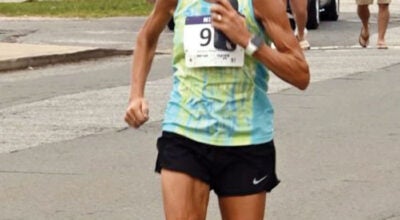Saving Carrie: Sixty people helped save Carrie Brown’s life by donating blood
Published 12:00 am Friday, May 8, 2009
By Susan Shinn
sshinn@salisburypost.com
The scar is jagged and ugly. It begins at Carrie Brown’s breastbone and runs the length of her torso. It’s raised and it’s hard, and she can feel it under her clothes. She can still see where the dozens of staples left their marks.
She sees it every day, and she hates it. It’s a reminder of what happened five months ago ó of how, in her mind, there will never again be any such thing as a “routine procedure.”
Carrie nearly bled to death, and the scar is a reminder of the incredible fight to save her life.
It’s a reminder that she’s alive.
Carrie and her husband, David, both 30, recently celebrated their third anniversary.
They’d been trying unsuccessfully to get pregnant, and decided to go to Jacksonville for further testing. Carrie grew up in Jacksonville. Her father, Tom Hunt, was a Marine, who was killed in a car accident in 2002. Her mom, Del, still lives there, and referred Carrie to a physician there.
On Nov. 17, Carrie went in for a routine outpatient procedure.
She went to surgery at 10:30 a.m., and went to the recovery room an hour later.
But she wasn’t recovering.
Unbeknownst to the hospital staff, complications from the procedure had resulted in internal bleeding.
“She was in recovery but she was not responding the way she should have been,” David says.
Doctors told David she’d have to spend an extra hour at the hospital.
Then they decided to keep her overnight.
Later in the afternoon, Carrie was moved to intensive care.
“I didn’t know what was wrong,” David says.
“They started giving me blood,” Carrie says.
Nothing was working.
Carrie was in severe pain on her right side, and her stomach became distended.
Doctors suspected she was bleeding internally, and if that was the case it was more than they could handle in Jacksonville.
“I was lying on my back but I couldn’t breathe,” Carrie says. “I was drowning in my own blood, basically.”
She didn’t understand what was happening, but she felt she was at the end of her life.
“I told everybody, this is it, I’m going,” Carrie says. “My dad was taken to the hospital in Jacksonville, and I thought, I can’t die in this hospital.
“I just didn’t want to die there.”
Just after 8 that evening, the decision was made to airlift Carrie to Pitt County Memorial Hospital in Greenville.
By this time, other family members had gathered.
Carrie’s brother drove David to Greenville. Carrie’s mom and aunt stayed behind to make sure she made it onto the helicopter.
David hurriedly filled out paperwork.
“We’ll see you in Greenville,” he told his wife.
But he wasn’t sure what would happen once they got there.
During the flight, she began throwing up blood.
By 10 that night, David was thinking the worst. He talked with Carrie’s mom about whether he should bury her with or without her wedding rings. He wondered if a firefighter buddy could play bagpipes at her funeral.
But, he says, “I felt good about her being at a better facility.”
Then he met the surgical team who would save his wife’s life.
David contacted Carrie’s boss, who is an oral and maxillofacial surgeon.
“He was a big help,” David says. “I’m not a medical person. I didn’t even know the right questions to ask.”
He did know Carrie’s blood pressure had dropped to 40/20, and all the color had drained from her face.
Carrie went into surgery shortly after arriving in Greenville.
“We didn’t hear anything, not a peep, ’til 2:15,” David says. “Nobody came out, because it was so critical.”
The couple learned later that, between the hospitals in Jacksonville and Greenville, Carrie received 60 units of blood.
Sometime during that long, long day and into the night, 60 people helped save Carrie’s life.
They lost Carrie twice on the operating table.
She received a graft on the main artery of her right leg because of the lack of circulation to it during the bleeding. It must be checked every four months by ultrasound.
Surgery had gone well, but now Carrie was facing a long recovery. She was in a medically induced coma, breathing by ventilator. Doctors told David to plan on spending six to eight weeks in Greenville.
“It was definitely a bad dream,” David says. “It doesn’t seem like reality. You go in for an outpatient procedure and you both plan on working the next day, and now the future was unknown.”
The trauma surgeon warned David of all the potential post-surgical complications.
“What’s the best-case scenario?” David asked.
“I just gave it to you,” he said.
But Carrie had other plans.
“She really bounced back,” David says.
Medical personnel pushed fluids to flush out her kidneys, which meant Carrie gained some 60 pounds of water weight on her tall, thin frame.
She had to undergo a second surgery two days after the initial surgery for surgeons to close her wound.
“Each day was like a miracle,” David says. “The same families were in the ICU waiting room. Carrie got better every day. It was so encouraging to me. Other people weren’t having such a good day. For us, we were the lucky ones.”
Lucky indeed.
Carrie defied her doctors’ predictions, getting out of the hospital in just nine days, on the Wednesday before Thanksgiving.
“You realize how fragile everything is,” David says. “That’s when we experienced the importance of blood donation.”
Carrie’s trauma surgeon told her he couldn’t believe she’d made it.
He said he couldn’t wait to go home and tell his wife the ending to this story ó a happy ending, for a change.
But Carrie’s ending has not been completely happy. She was out of work for three months. She couldn’t drive. She’s been on medication for pain.
On New Year’s Eve, her toes began to swell, and she feared her graft was failing. It turned out to be an allergic reaction to blood thinner.
“There’s not been a lot of days I don’t have pain,” Carrie says.
She’s returned to work and she’s working on regaining her stamina.
Carrie still wants to get pregnant. She’s begun seeing physicians at Reproductive Endocrinology Associates of Charlotte ó and she’s consulted with a plastic surgeon about that scar.
“In her mind,” David says, “she’s very frustrated, she’s very angry. I don’t care at all about the scar. I just hate it for her. I’m thrilled she’s doing well, but she didn’t sign up for this.”
“I wonder, am I being punished, was it something I did?” Carrie says.
“She’s so lucky to be alive but some days, she doesn’t feel it,” David says. “She’s strong, she’s tough.”
When she scrubs in with her boss in the operating room, she can still see herself lying on that table.
But Carrie has had a lot of help in her recovery.
“Everybody really rallied around our situation,” says David, the son of James and Erna Brown of Kannapolis.
And she’s had her dad.
“I believe he’s my guardian angel,” Carrie says.
She can’t give blood for 12 months, but she’s given in the past and plans to do so again.
“Giving blood allows you to be part of somebody’s life,” David says.
Sometimes, it takes 60 people to save one life.
New Hope Lutheran Church, where James and Erna Brown are members, is sponsoring a blood drive in Carrie Brown’s honor. The drive is set for Monday, May 11, from 3 to 7:30 p.m. No appointment is necessary. For more information, call the church office at 704-932-3716.



